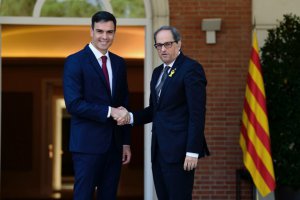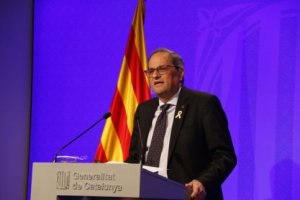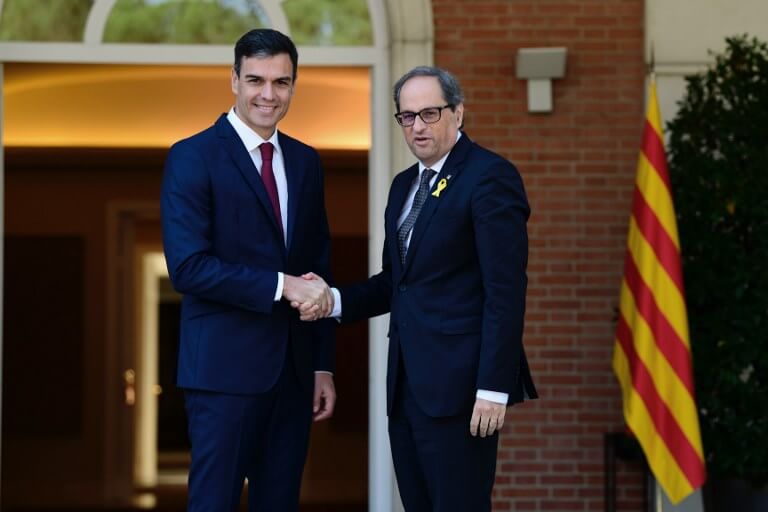Catalan President Quim Torra has requested an ‘urgent meeting’ with acting Spanish Prime Minister Pedro Sánchez to discuss developments in the closing stages of the Catalan Trial, as well as the recent report from the UN Working Group on Arbitrary Detention calling for some of the imprisoned leaders to be released.
Torra is expected to raise concerns with his Madrid counterpart, who is yet to be formally confirmed as prime minister following the 28 April General Election, over accusations in the Supreme Court of a ‘coup d’état’ during the 2017 independence drive.
He will also raise the conclusions of a study by the UN working group which stated that the detention of three of the defendants in the trial was ‘arbitrary’ and that the 1 October referendum was within Spanish law.
‘The repression is not stopping but it has to stop,’ he said.

In an interview with the Catalan public broadcaster TV3 on Wednesday morning, the head of the Catalan government insisted that a decision on whether to call a snap election in the autumn will be his alone and not that of his predecessor Carles Puigdemont.
ALSO READ: Spanish PM pledges fresh dialogue with Catalan leader
Torra added that Ernest Maragall should be Barcelona mayor as part of a pro-independence coalition with his Junts per Catalunya (JxCat) party after the Esquerra Republicana (ERC) candidate won the most votes but less than half the seats needed for a majority.
He also said that the overall trend in the Catalan results from the Spanish general election in April and the European and local elections in May, with Esquerra the most popular party, showed that there was a ‘social majority’ in favour of Catalan independence.
Later in the day, the speaker of the Catalan Parliament, Roger Torrent, seconded Torra’s demands, appealing to the Spanish government to put an end to the prosecutors’ accusations against the Catalan leaders.
‘After what we saw yesterday [day 50] in the Supreme Court, with the public prosecutor acting as the far right, I speak directly to president Sánchez: Enough. Stop accusing 80% of Catalans of a coup d’état,’ he said.
Regretting that the Spanish government is ‘ignoring’ what ‘the majority of Catalan society wants’, Torrent called on Sánchez to show ‘bravery and courage in accepting dialogue and providing a democratic solution to the conflict in our country.’

Quim Torra – one year as Catalan President
On Tuesday, Quim Torra also gave an account of the first year of his troubled presidency, which came about after months of direct rule from Madrid – a reaction to a referendum and a declaration of independence in the fall of 2017.
Torra blamed Spain and the government led by Pedro Sánchez for the standstill in the talks to find a way out of the independence crisis. ‘Someone left the negotiating table, and it was not us,’ he said.
Torra credited his government for putting the administration back on track after the suspension of self-rule, which he says caused ‘great losses’ to Catalan finances.
While Torra has repeatedly been accused of government paralysis, he put down criticism claiming that Catalonia is ‘back on the move and ready’.
The Catalan president blamed Sánchez for abruptly putting an end to the talks between the executives, which were only made possible after pro-independence parties in the Spanish parliament helped the Socialists oust Mariano Rajoy from power.
Once again, Torra asked for an observer to be present during Catalan-Spanish meetings – a proposal that sparked outrage among right-wing opposition parties and which ultimately set the course for a snap general election.
ALSO READ: Sánchez dismisses Torra’s ‘monologue’ document
With Sánchez endowed with a fresh election victory, Torra has urged him to make clear what are his plans for Catalonia: ‘So far, I haven’t heard what are his proposals. We want a referendum on independence. What is their plan?’
With the final verdict of the Catalan Trial looming, all eyes are on Torra and how his government will react to the most than likely prison sentences for pro-independence leaders. He called for a “unitary response” by Catalan society, and while denied any possibility of a snap election, he didn’t rule out calling a new referendum on independence.


